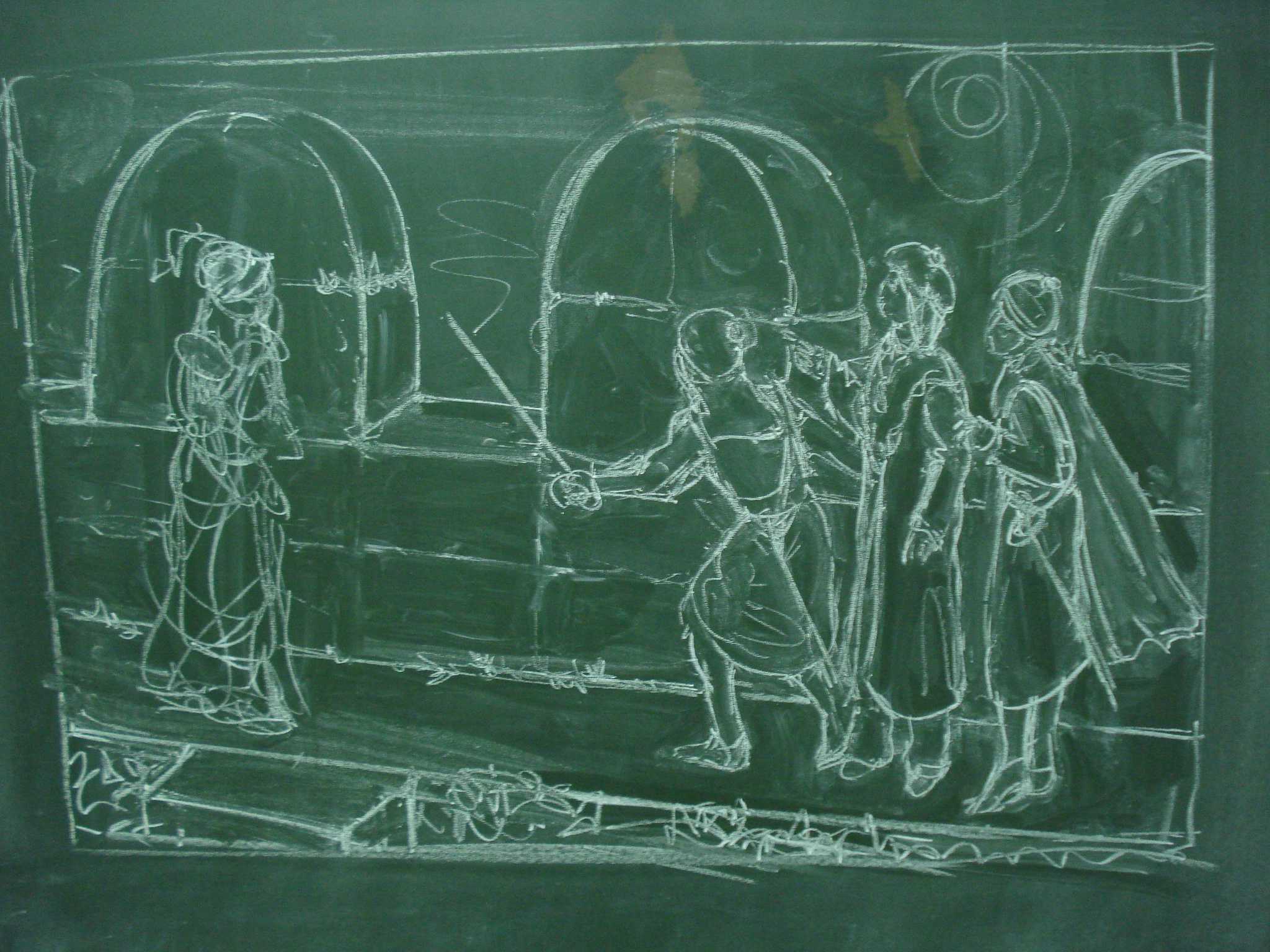The following is the first installment of a two-part series.
An interesting strand of contemporary theory designates the specificity of capitalism with the qualifier “cognitive.”[1] I do not write under this term, although I am influenced by theorists who do insofar as they also highlight communication. Franco Berardi, for example, observes that “cognitive labor is essentially a labor communication, that is to say communication put to work.”[2]
While communication encompasses a wide array of waged and non-waged activities expropriated for and exploited by contemporary capitalism, the term “cognitive capitalism” feels to me like an academic version of the hacker dream of leaving the meat. It gives away too much. The term accepts the neoliberal claim for a knowledge society wherein workers are primarily creative workers or a kind of “cognitariat.” It’s not surprising, then, to find those interested in contemporary knowledge management emphasizing the convergence between capitalist management gurus like Peter Drucker and Marxists Antonio Negri and Paulo Virno.[3]
In a way, the term “cognitive capitalism” makes the world appear smarter than it is, as if intelligence replaced manufacturing when in fact manufacturing was pushed out of some countries and onto others in the search for ever cheaper labor, when factory work was becoming all the more brutal and massified even if less visible.[4] Further, the term cognitive capitalism implies that affective labor is something new. This obscures rather than acknowledges the long histories of women’s affective labor and the struggles around attempts to enclose it in the home and harness it for capital.[5] Finally, “cognitive capitalism” overplays immateriality even as it brings materiality, meat, bones, and blood back in via the emphasis on brains.
And here especially I am reluctant to embrace the term because of the ways its diagnoses, the pathologies it identifies, can be rendered functional for capital: they can tell capital what it needs to fix. Workers too depressed? Try Zoloft! Working so many hours that focus is impossible? Try Adderall! Or, in a more recent configuration, one that is sinister in its playfulness: bored by your screen of spreadsheets and memos? Watch some cute kitty videos – these improve worker efficiency![6]
Rather than viewing contemporary capitalism as cognitive, I view it as communicative.[7] As Hardt and Negri write, “Communication is the form of capitalist production in which capital has succeeded in submitting society entirely and globally to its regime, suppressing all alternative paths.”[8] Whether of affects, images, anxieties, or ideas, communication is the means of capitalist subsumption, the vehicle for its intensification and expansion. My focus here is on one pathology associated with the capture and instrumentalization of our communicative capacities, that it to say, on what happens when our basic sociality serves as a primary means of capitalist expropriation, which it has since capitalism began.
This pathology is the individual form of subjectivity, a form that emerges historically and is today the site of opposing dynamics, of pressures that simultaneously disperse, concentrate, and overburden individuality as personal singularity. My discussion might be particular to the hyper-individualistic culture of the United States. In an overview of histories of the individual, the political theorist Steven Lukes describes differences among nineteenth century French, German, English, and American concepts of the individual, noting how the American version implied capitalism, liberal democracy, and the American Dream.[9] I do not attend to these differences (and so may over generalize from an American situation, which may still be beneficial insofar as it sets out a kind of imperialist individuating). Rather, I focus on the individual as a form like the commodity is a form.
The commodity is a form for value. The individual is a form for subjectivity, indeed, a form endeavoring to abolish collective subjectivity by separating it into and containing it within individuated bodies and psyches. C.B. MacPherson locates a “possessive individual” at the heart of the liberal theory of the seventeenth century which conceived the individual “as essentially the proprietor of his own person or capacities, owing nothing to society for them.”[10]
For liberals like Thomas Hobbes and John Locke, MacPherson argues, “The human essence is freedom from dependence on the wills of others, and freedom is a function of possession.”[11] This individual is not understood as part of something larger, as fundamentally interconnected with others, as dependent on relations to others human and nonhuman. Rather, it is a proprietor of capacities engaging other proprietors.
This necessarily and unavoidably capitalistic orientation, fundamental not only to liberal understandings of property but also to the market and to contracts, is crucial to MacPherson’s critique of liberalism. We should note its fundamental reflexivity: proprietorship relies on a series of separations and enclosures. Capacities are separate from others as well as separate from the self or ego, which can thus enclose these capacities within its person. Training, whether moral or technical, is then work on and for the self rather than part of collective reproduction for the common good. Enclosed within the individual, capacities become so many objects available for exchange, and, as capitalism evolves and expands, for investment, stylization, and self-branding.
Even as I treat the individual as pathology, I also consider how we are moving beyond the  pathology of the individual form. The last couple of years have been tremendously exciting. People have come together in opposition to capital and its demands for cuts, austerity, and more and more money for the one percent. Critical analyses of our setting and diagnoses of the pathologies plaguing it need to be supplemented by attention to the ways people are already overcoming them, moving beyond them, expressing new or formerly repressed capacities.
pathology of the individual form. The last couple of years have been tremendously exciting. People have come together in opposition to capital and its demands for cuts, austerity, and more and more money for the one percent. Critical analyses of our setting and diagnoses of the pathologies plaguing it need to be supplemented by attention to the ways people are already overcoming them, moving beyond them, expressing new or formerly repressed capacities.
My tag for this beyond is “collective desire.” My research in this direction is just beginning, still provisional and influx.[12] The intuition I pursue here is that recognizing the pathological nature of the individual form lets us see possibilities for emerging senses of and desires for collectivity. More precisely, rather than looking at drugs and mental illness as pathologies, we should consider the likelihood that the individual form itself is the pathology; drugs attempt to maintain it, keep it going.
The individual, then, is pathological in the sense that the setting in which it functioned is passing away. So the problem is not that the extremes of a contemporary capitalism that has merged with the most fundamental components of communicativity is making us depressed, anxious, autistic, and distracted and so we need to find ways to preserve and protect our fragile individualities. Rather, depression, anxiety, autism, and hyperactivity signal the breakdown of a form that was always itself a problem, a mobilization of reflexivity, a turning inward, to break connection and weaken collective strength.
The setting that is passing away is bourgeois capitalism. I use “bourgeois capitalism” to indicate an economic form inclusive of industrial as well as post-industrial, communicative, capitalism; Keynesian as well as neoliberal approaches to the economy; and a vision of the subject as a free, rational, individual as well as the critique of the exclusivity of this vision. In bourgeois capitalism, the individual appears as a form of freedom even as it functions as that enclosure of the common that fragments, disperses, and diminishes that collective power capable of guaranteeing freedom.
As capitalism has intensified, so have the pressures for and on the individual. The individual is called on to express her opinion, speak for herself, get involved. She is told that she, all by herself, can make a difference – collective action, though, that’s off the table, either impossible or too repressive to constitute a real alternative. It is no wonder that communicative capitalism enjoins us to uniqueness, to specialization and specificity: we have to distinguish ourselves to get hired or, for most of us, to maintain the fantasy of something like a fair competition (it would be horrible to think that we went into enormous debt for nothing, that we put all the work into a proposal, design, or manuscript that had no chance).
At the same time, this specialization supports marketers’ interests in ever more granular access to customers, police efforts to locate and track, and capital’s concern with preventing people from coalescing in common struggle. Once we acknowledge, however, that the individual form is not threatened but is the threat, not a form to be preserved but one whose dissolution points to emerging collectivity, then we can move beyond the diagnosis of the pathologies of what has already past and amplify alternative tendencies in the present.
Alone Together
Sherry Turkle’s ethnography of people and machines explores “networked life and its effects intimacy and solitude, on identity and privacy.”[13] Reporting on her interviews with teenagers, Turkle describes young people waiting for connection, fearful of abandonment, and dependent on immediate responses from others even to have feelings. For example, seventeen-year-old-Claudia has “happy feelings” as soon as she starts to text.
Unlike a previous generation that might call someone to talk about feelings, when Claudia’s wants to have a feeling, she sends a text.[14] Turkle also reports people’s anxieties about face-to-face interactions, expectations associated with the telephone, that is, speaking to another person in real time (205), and the multitasking that implants an uncertainty as to whether another is even paying attention.
Combined with pressures for immediate response and the knowledge that the “internet never forgets” insofar as it’s difficult for most of us to eliminate all traces of our digital identities after they’ve been uploaded, archived, and shared, our new intimacy with technology, she demonstrates, is affecting the kinds of selves we become. We experience solitude, privacy, connection, and others differently from how we did before.
For Turkle, these new experiences are pathological.[15] Drawing from Erik Erikson’s work on personal identity, she argues that networked technologies inhibit the kind of separation necessary for maturation. Parents are always in reach, available, even if they are not actually present but themselves over-worked, distracted, and over-extended. Young people do not learn how to be alone, how to reflect on their emotions in private. Fragile and dependent, they fail to develop that sense of who they are that they need to have “before” they “forge successful life partnerships.”[16]
Rather than inner-directed and autonomous (Turkle refers to David Riesman), the culture of mobile phones and instant messaging has raised other-directedness “to a higher power.”[17] The expectation of constant connectivity eliminates opportunities for solitude even as people are “increasingly insecure, isolated, and lonely.”[18] Turkle concludes, “Loneliness is failed solitude. To experience solitude, you must be able to summon yourself by yourself; otherwise you will only know how to be lonely.”[19]
On the one hand, Turkle is surely right. There is nothing surprising in her account of contemporary “tethered selves.” From her diagnoses of narcissism (which in their gesture to what is arguably Freud’s most unreadable essay could be seen as indexing the fraught problematic of individuation) to her worries about the constant and even addictive character of networked communications, she repeats already well-known criticisms of teens and media.
On the other hand, the language Turkle employs when she speaks of solitude might signal something more than an updating of the critique of mass and teen culture for a networked age. She uses the second person– “you must be able to summon yourself by yourself”—and shifts from a descriptive to an imperative mode: “you must” if you are to know something besides how to be lonely.
 Turkle relies on this mode because she has described the reflective individual as threatened by networked technologies and she wants us to join her in defending the individual from this threat. Directly addressing the reader, she insists that the reflective individual be shored up (even as she rejects technologically mediated forms of this shoring up as themselves pathological).
Turkle relies on this mode because she has described the reflective individual as threatened by networked technologies and she wants us to join her in defending the individual from this threat. Directly addressing the reader, she insists that the reflective individual be shored up (even as she rejects technologically mediated forms of this shoring up as themselves pathological).
For Turkle, a self that is less bounded, more expansive, less separate, more connected, is immature, at risk of loneliness. It needs to form its identity, separate itself from others, and go through the stages of its becoming individual. I should add here that what Turkle links to technology, Dany-Robert Dufour (in The Art of Shrinking Heads), has linked to the acceleration of the process of individuation more broadly, particularly in connection to the decline in symbolic efficiency or change in the structure of the symbolic.[20] The contemporary subject, he says, is called upon to create itself.[21]
Turkle’s interviewees describe themselves in ways that rub up against Turkle’s own concerns with separation and individuation. For example, a nurse, tired after eight hours at work and a second shift at home says that she logs onto Facebook and feels less alone. A college junior explains, “I feel that I am part of a larger thing, the Net, the Web. The world. It becomes a thing to me, a thing I am part of. And the people, too. I stop seeing them as individuals, really. They are part of this larger thing.”[22]
The student’s words here remind me of a line from Felix Guattari in “The micropolitics of fascism”: “The collective engagement is at once the subject, the object and the expression. No longer is the individual always the reference point for the dominant significations.”[23] The college junior feels himself and others to be part of a larger collectivity such that viewing himself and others as separate, as individuals, makes no sense; it loses the connection that arises through their mutual engagement.
For Turkle, though, connectivity is so pathological that she depicts it biochemically, as an addiction. Her argument relies on Mihaly Csikscentmihalyi’s work on “flow.” Most references to flow are positive, descriptions of a desirable experience of focus, involvement, and immersion. Turkle’s, however, is critical: “In the flow state, you are able to act without self-consciousness” (as I will explore in a minute this absence of self-consciousness is an attribute crowds theorists also associate with being in a group, mass, or crowd).
For Turkle, this acting without self-conscious is a problem because “you can have it when  texting or e-mailing or during an evening on Facebook” (again, the use of the second person pronoun points to Turkle’s own anxiety, her attempt to implicate us in practices that are threatening and most be combatted).[24] Melding game and life, that is, actual games like World of Warcraft, with email and Facebook, Turkle explains, “When online life becomes your game, there are new complications. If lonely, you can find continual connection. But this may leave you more isolated, without real people around you. So you may return to the Internet for another hit of what feels like connection.”[25]
texting or e-mailing or during an evening on Facebook” (again, the use of the second person pronoun points to Turkle’s own anxiety, her attempt to implicate us in practices that are threatening and most be combatted).[24] Melding game and life, that is, actual games like World of Warcraft, with email and Facebook, Turkle explains, “When online life becomes your game, there are new complications. If lonely, you can find continual connection. But this may leave you more isolated, without real people around you. So you may return to the Internet for another hit of what feels like connection.”[25]
She uses neurochemistry to justify the language of addiction: “Our neurochemical response to every ping and ring tone seems to be the one elicited by the ‘seeking’ drive, a deep motivation of the human psyche. Connectivity becomes a craving; when we receive a text or an e-mail, our nervous system responds by giving us a shot of dopamine. We are stimulated by connectivity itself. We learn to require it, even when it depletes us.”[26]
What’s interesting in Turkle’s pathologizing treatment of connectivity is the way she blurs interaction with machines—phones, computers—with interactions with people. Our brains react to sounds by releasing—injecting—dopamine. But rather than this reaction being a valuable reinforcement of our connections with others, it is a dangerous stimulant that can deplete us. Would happy neurochemical responses to seeing people face-to-face be similarly suspect? Is the thrill of contact with others at a party, in a rally, at a concert, or in a crowd also at risk at becoming a craving insofar as such intense and demanding contact might also deplete us?
Jodi Dean is ‘Donald R. Harter ’39 Professor of the Humanities and Social Sciences at Hobart and William Smith Colleges. She is the author among other books of Crowds and Party (Verso 2016), Blog Theory (Polity 2010), The Communist Horizon, (Verso, 2012), Democracy and Other Neoliberal Fantasies (Duke University Press, 2009), Zizek’s Politics (Routledge, 2006), Reformatting Politics (Routledge 2006) (coedited with jon Anderson and Geert Lovink), and Empire’s New Clothes: Reading Hardt and Negri (Routledge 2004) (coedited with Paul A. Passavant). She is the former co-editor of Theory and Event.
___________________________________________________________
[1]These theorists include Franco Berardi, Christian Marazzi, Yann Moulier Boutang, Michael Hardt and Antonio Negri, and others influenced by the Italian workerist tradition.
[2] Franco Berardi, The Soul at Work, translated by Francesca Cadel and Giuseppina Mecchia (Los Angeles, CA: Semiotext(e), 2009).
[3] Michael A. Peters and James Reveley, “Knowledge Work Under Cognitive Capitalism,” Truthout, May 18, 2012. http://truth-out.org/opinion/item/9035-knowledge-work-under-cognitive-capitalism.
[4]See George Caffentzis, “A Critique of ‘Cognitive Capitalism,’” in Cognitive Capitalism, Education, and Digital Labor, edited by Michael A. Peters and Ergin Bulut (New York: Peter Lang, 2011).
[5]See Silvia Federici, “On Affective Labor,” in Cognitive Capitalism, Education, and Digital Labor.
[6] Sarah Kliff, “Want to improve your productivity? Study says: Look at this adorable kitten!” the Washington Post, October 1, 2012. Available at http://www.washingtonpost.com/blogs/wonkblog/wp/2012/10/01/want-to-increase-your-productivity-study-says-look-at-this-adorable-kitten/.
[7]For a more complete discussion of communicative capitalism see Jodi Dean Publicity’s Secret (Ithaca, NY: Cornell University Press, 2002), Democracy and Other Neoliberal Fantasies (Durham, NC: Duke University Press, 2009), and Blog Theory (Cambridge, UK: Polity Press, 2010).
[8] Michael Hardt and Antonio Negri, Empire (Cambridge, MA: Harvard University Press, 2000) 347.
[9]Steven Lukes, “The Meanings of Individualism,” Journal of the History of Ideas, Vol. 32, No. 1 (Jan. – Mar., 1971), pp. 45-66.
[10] C. B. Macpherson, The Political Theory of Possessive Individualism: Hobbes to Locke (New York: Oxford University Press, 1964) 3.
[11] Ibid.
[12] For a provisional account of collective desire, see Chapter 5 of my The Communist Horizon (London: Verso, 2012).
[13] Sherry Turkle, Alone Together (New York: Basic Books, 2011) 169.
[14] Turkle, 176.
[15] Turkle, 178.
[16] Turkle, 175.
[17] Turkle, 167,
[18] Turkle, 157.
[19] Turkle, 288.
[20] Dany-Robert Dufour, The Art of Shrinking Heads (Cambridge, UK: Polity Press, 2008).
[21] Dufour, 16.
[22] Turkle, 168.
[23] Felix Guattari, Molecular Revolution, translated by Rosemary Sheed (New York: Penguin, 1984) 203.
[24] Turkle, 226.
[25] Turkle, 227.
[26] Turkle, 227.




